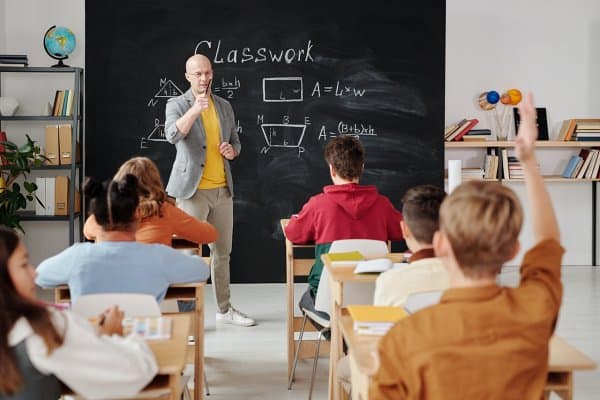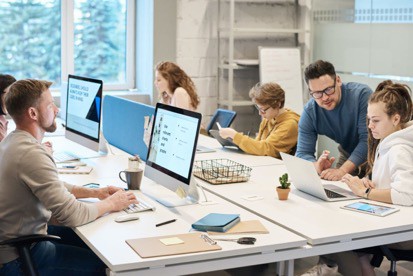5 Key Interpersonal Skills to Develop in Students
Paul Freire advocated a liberating education aimed at the autonomy of the subject. He criticized the traditional curriculum calling it banking education, which would be a process in which teachers only deposit content and are archived in mind.
According to William Glasser’s pyramid theory of learning, we learn 70 percent when discussing, talking, asking, and debating the topic. In comparison, 95 percent of the time knowledge is known when teaching someone, explaining, summarizing, defining, and structuring knowledge.
So students need to be minimally curious and proactive people. Here’s a list of 5 Key Interpersonal Skills to Develop in Students:
- Proactivity
- Creativity
- Public Speaking
- Reflexive or critical thinking
- Team-work
5 Key Interpersonal Skills to Develop in Students
1. Proactivity
When we are proactive people, we volunteer to help others, whether we have introverted or extroverted personality this skill is a matter of what we see and feel the need to join.
When we join other activities, it can help our teachers list notes and read an extra book to present to the class, mainly when it is a subject that is non-belonging to our comfort zone.
One of the advantages of volunteering to join activities we barely know about is that we will acknowledge a bit more things that we didn’t.
Here is a table that can help us to see in reality how our proactivity is or where it may go:
| Subjects that I like | What I learned from them | What skills do I need? | Things I feel uncomfortable to try and now I will |
2. Creativity
Creativity is considered a human capacity of outstanding universal value and responsible for significant changes, transformations, and solutions. As students, a social group that is still discovering certain subjects’ creativity can be the key to evolution.
Contrary to what many imagine, creativity is not a gift but a competence that – like any other – can be developed by those who do not have it and perfected by those who are already slightly creative.
It takes courage to be creative because that involves going out the box and some times bringing up ideas that most won’t like or even want to entertain.
How can we stimulate our brain to be creative?
- Go often to debates and seminars to practice active listening and discover new perspectives of thinking;
- Start by reading articles and watching videos on specific subjects, and gathering more information. If possible, enroll in extracurricular courses at school or college;
3. Public Speaking
Communication is fundamental to socialization, and every moment, event, or context demands different forms of message content. Developing this competence implies much more than just knowing and mastering the norm: it also requires perception, dedication, and training.
When we are students, we need to learn public speaking, and we can improve them by participating in various activities like debates, group discussions, recitations, and spelling competitions.
The school environment provides the right place and time to practice and make mistakes, making students learn faster; it also improves confidence and helps them connect with people.
Highly Recommended Article
What Makes a Great Presenter? 9 Key Qualities to Look for
What can we do if we are afraid or feel uncomfortable during public speaking?
- Practice lines in small groups so you can get familiar with being observed;
- Be open to feedback;
- Have a structure for your narrative;
- Opening up if we don’t have a clue about what is being asked;
- Learn as much as you can about the topic, so the anxiety will ease out.
The author of the bestseller “The Power of the Quiet,” Susan Cain, became a TED Talker hit when she discussed the subject.
She, being introverted, managed to overcome her fears and became a reputed speaker. Cain says that the key to overcoming the challenge of public speaking was practicing lines in small groups, where she felt at ease.
4. Reflexive / Critical thinking
Reflexive or critical thinking is the ability to look into the past and develop understanding and insights into what has happened and use that information to develop a deeper understanding or to choose a course of action.
Once something’s become a habit, it’s hard to leave it. In school, what we acknowledge can become a routine because we frequently interact with less challenging proposals.
Therefore, many students don’t even reflect on the thought; the idea comes automatically, only recovering and reproducing information without analyzing or thinking about it.
How can we start developing reflexive/critical thinking?
- Focus your time and energy on thinking and creating strategies to improve the internal processes – the way you think;
- Always ask yourself why you have not been able to resolve a situation and what you can do to fix that situation;
- No emails, to-do lists, Whatsapp, or Facebook during reflection. Take this time to read a book.
5. Team-work
Team-work is a skill that allows us to have to collaborate with multiple people to conclude a joint project. This means that students who participate in group activities to reach goals learn to cooperate and coordinate.
Sometimes we will be in certain professional positions in life that to lead to a successful result it takes team-work.
Working in a team means creating a collective effort to solve an issue.
However, each member takes dedication to carry out a task aiming to complete a specific function, but all united by a single goal, achieve the much-desired work.

How can we be helpful in team-work?
- Being open and honest about our abilities;
- Clarifying roles and responsibilities to each member;
- Making sure you are communicating with the team about what is happening;
- Offering a hand to a teammate he may be needing one and not saying;
- Making decisions together.
Even though each member has a task to do, it doesn’t mean we need to be apart, remember you are working for the same goal.
Conclusion
Among the primary forms of expression are speech, writing, sign languages, and body language expressions that often transmit even what we wish to hide.
Although communication is vital and happens every day, we need to improve it and adapt it to various situations. For students, it’s no different!
After all, human beings develop from the relationships established between individuals. Such abilities are present in all social interactions, from daily situations such as shopping in a supermarket, to more complex ones such as how to deal with conflicting positions in the workplace.
References and Further Reading
GONZALEZ, Jennifer. The Cult of Pedagogy Podcast. Google Podcast
The Wabash Center’s Dialogue on Teaching. Google Podcast
HOLT, Mitchell. Effective Teamwork & Interpersonal Skills. CHRON








